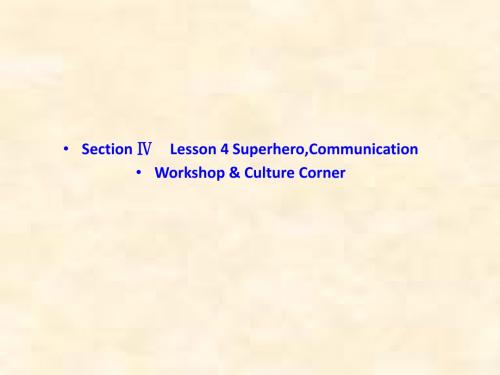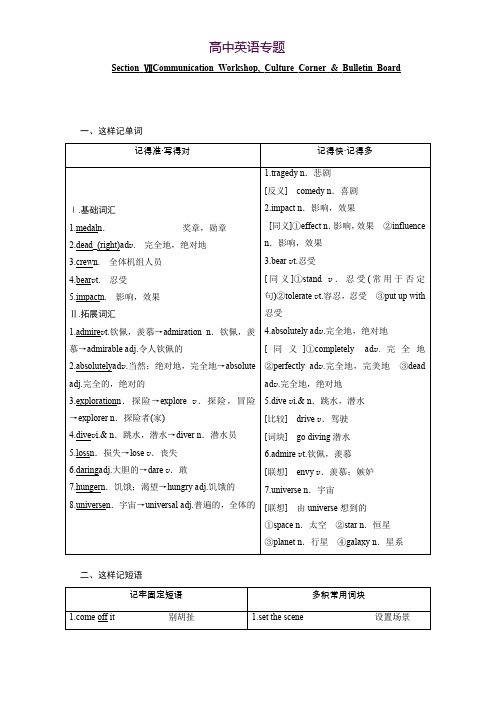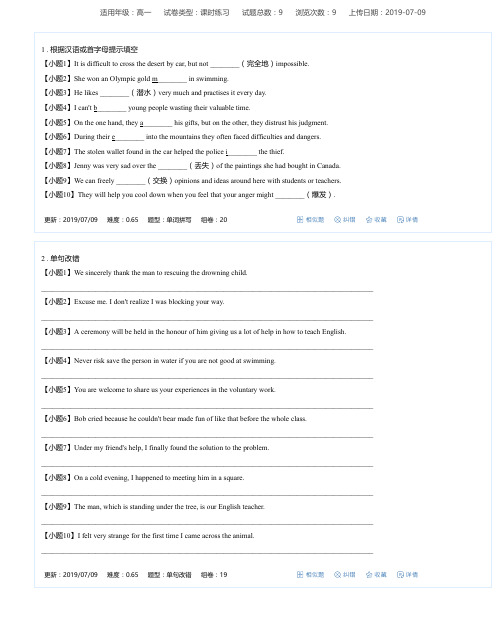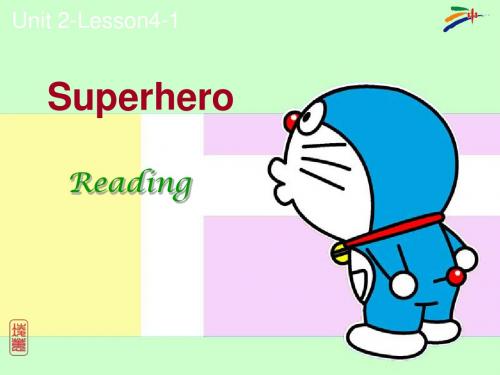北师大版高一(上)英语必修一Unit2CultureCorner
- 格式:pdf
- 大小:3.21 MB
- 文档页数:20


Section_ⅦCommunication_Workshop,_Culture_Corner_&_Bulletin_Board 一、这样记单词二、这样记短语三、这样记句式1.(教材P30)Make notes about your opinions. (e.g. who you admire—Ge Fei, the badminton champion)记录你们的观点。
(例如,你钦佩的人——羽毛球冠军葛菲)admire vt.钦佩,羡慕;欣赏compliments(赞美).(2013·湖北高考短文写作)同桌非常羡慕我流利的英语,我经常被他的赞美所鼓舞。
②We admire the old scientist for his great contribution to the country.我们钦佩这位老科学家对国家作出的巨大贡献。
③We expressed/had_admiration_for the soldiers, who behaved bravely in the action.我们对解放军战士在这次行动中英勇的表现表示钦佩。
2.(教材P32)For the families of the seven, we cannot bear, as you do, the full impact of this tragedy.对于这七位英雄的家庭来说,我们也像你们一样,不能承受这次悲剧的巨大冲击。
bear v.容忍;忍耐;支撑,承担(责任) n.熊她担心自己不能忍受疼痛。
②My leg was painful, and I wasn’t sure if it would bear my weight.我的腿很痛,不知道是否能承受我身体的重量。
③She can’t bear to be looked down by others.=She can’t bear/stand being_looked (look) down by others.她无法忍受被人瞧不起。


《Unit 2 Heroes》Culture CornerCulture CornerAsk students what they know about the 1986explosion of the space shuttle, Challenger. What would it be like to lose a family member on a space mission? How should we remember the astronauts who died in space or during space programme training?ExerciseStudents read the text and find the answers.Answers1. Russian2. American3. Israeli4. AmericanOptionsPracticeDivide the class into groups and give each group some paper and a marker. Ask the groups to choose a writer to make a word list. Then allow students 6 minutes to think of and write down as many English words as possible that appropriately describespace heroes. Collect each group’s work and put it up on the board. The group with the most relevant and correct words wins the competition.ExtensionAsk each group to choose three words from their list and explain to the class why they thought the words are relevant to describing space heroes.Bulletin BoardObjectives■To talk about heroes/ heroines■To write a description of a personal hero / heroine ■To exchange ideas about significant people in one’s life■To further explore the theme of the unit■Students read the notice on the Bulletin Board and the two examples. Ask them to list the writers’ reasons for choosing their hero/heroine.■Then ask the students to name some people who they believe to be heroes / heroines. Why do they think these people are heroes / heroines? What qualities do these people have that are special? Remind students that heroes/heroines do not need to be famous and encourage them to look for heroes within their own families, communities, cities etc.■Ask the students to choose one person from their list andwrite a passage about them explaining their reasons forchoosing this person as their hero/heroine. Ask students toadd illustrations or photos to their passage.■Display the passages with the added illustrations or photos. Encourage students to read and discuss each other’s work.Unit DiaryObjectives■To reflect what and how much the students have learned.■To think about in what way they are learning.■To learn and identify the best ways for learning.■To develop students’confidence in taking more control of their studies.■To help teachers get a clearer insight into the students’learning of the language.Part 1 (1)This part gets students to think of the topics of the unit anddecide which is their favourite lesson.Part 2 (2-5)This part refers back to the unit objectives from the start ofthe unit. Students will think about what they have learned inthis unit.Part 3 (6)This part asks students to express their ideas about heroesand stars.Part 4 (7)This part focuses on the evaluation of the usefulness of theactivities for each of the tasks.Part 5 (8-9)This part gets students to reflect on the listening and readingtexts, to identify the vocabulary that students still have difficulties with in the unit. Part 6 (10)This part is the reflection of the stud ent’s learning style andstrategies. In fact, the eight choices are the suggestions forEnglish learning, which are helpful for students.。


高中英语北师大版必修1Unit2 Heroes《Culture Corner》省级名师优质课教案比赛获奖教案示范课教案公开课教案【省级名师教案】1教学目标The students are able to:1. distinguish the different usages between “that/which” and “when/where/why” in the att ributive clause2. summarize some expressions about how to describe a festival3. create a festival and then describe it using attributive clause2学情分析高三的学生已经具备了一定的语言运用能力,这一单元的复习不能仅仅停留在语言知识的复习上,学生应该要有能力上的提升,因此,把定语从句的复习和单元话题节日结合起来复习,培养学生在真实的语境中灵活地运用英语的能力。
培养学生的文化意识,了解中西节日习俗,并学会创设自己的节日。
3重点难点Important point:distinguish the different usages between “that/which” and “when/where/why” in the attr ibutive clauseDifficult point:create a festival and then describe it using attributive clause4教学过程4.1第一学时新设计Learning procedures:Step I. Lead-in: watch an MTVWhat is it about?Step II. Revision: make sentences about attributive clause according to the key words and th e pictures.。
Communication Workshop and Culture Corner 阅读理解专练阅读理解The last known American veteran (老兵) of World War Ⅰ,Frank Buckles, died at the age of 110 on February 27, 2011 at his home in West Virginia.Three years ago, Buckles attracted the crowd from his wheelchair in the Pentagon (美国国防部) hall, as speakers, including U.S. Defense Secretary Robert Gates, offered their praise and thanks. “We cherish the memory of those who have passed away,”said Gates.“We cherish the chance to say thank you in person to Corporal F rank Buckles. We will always be grateful for what they did for their country, and feel glad, too, for the long life that they enjoyed on this earth.”Buckles was also welcomed at the White House that week, by then-president George W. Bush. “It has been my high honor to welcome Mr. Buckles, and his daughter, Susannah,”said Bush. “Mr. Buckles has rich historic experiences. Thank you very much for your patriotism (爱国心) and your love for America.”Buckles wanted to serve when World War Ⅰ broke out, and his lie to the officer for his age made it possible. Shortly afterward, at the age of 16, he was sent to Europe as an ambulance driver. He saw the horror of war close up, driving the wounded from the trenches (战壕) to field hospitals. Later, he drove German prisoners back to Germany.Buckles left the army in 1920 and years later he went to work for a shipping company in the Philippines. When World War Ⅱ broke out, he and other Americans there were put in prison camps by the occupying Japanese forces. The cup he used at that time is in the background of his 2008 portrait (肖像), which now hangs with eight others along one of the Pentagon's many corridors.In a statement issued Monday, President Barack Obama and his wife Michelle praised Buckles, saying he continued to serve America until his death, as the Honorary Chairman of the World War Ⅰ Memorial Foundation. The Obamas said they joined the Buckles family in celebrating a remarkable life that reminded them of the true meaning of patriotism.1.We can learn from Paragraph 4 that Frank Buckles________.A.lived in Europe for sixteen yearsB.got wounded during World War ⅠC.changed his real age to join the armyD.was put in prison by German soldiers解析:细节理解题。